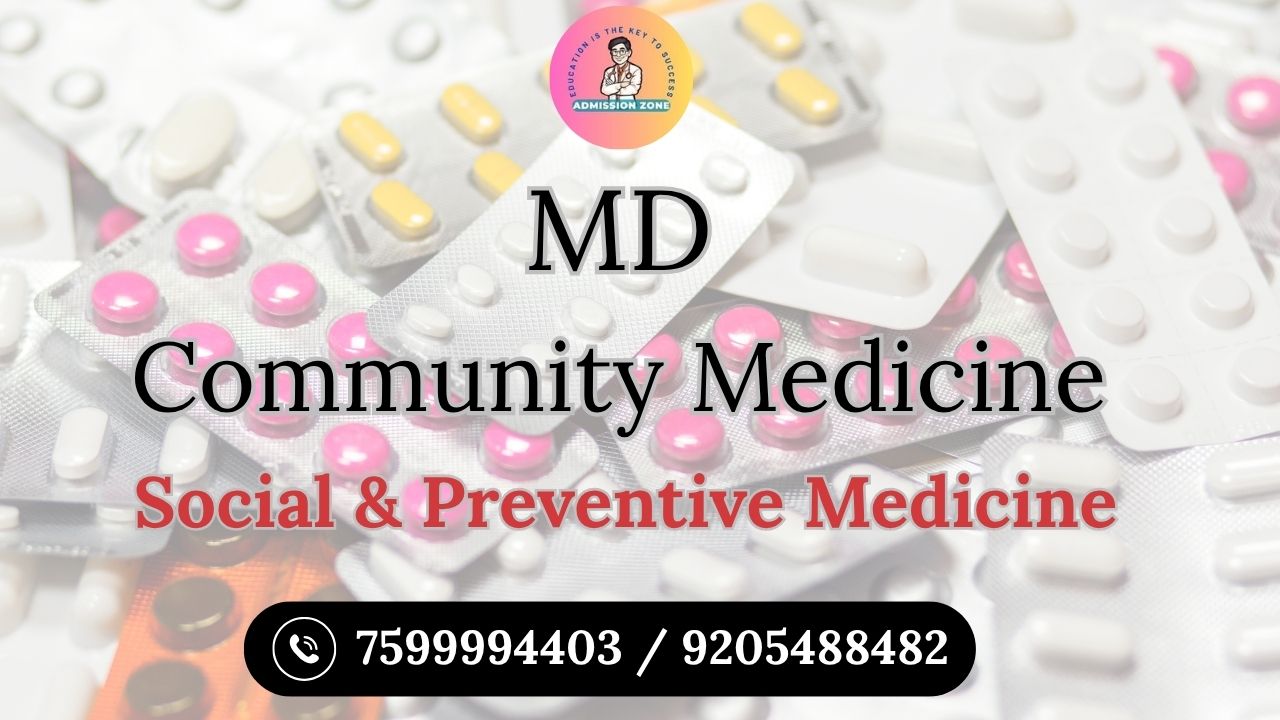
Check branches of medicine with insights into each specialty and their vital roles in patient treatment at Admission Zone.
Medicine is made up of many different branches, each focusing on a specific part of our health. Some doctors treat diseases, others perform surgeries, and some help with mental health. All these specialists work together to help people live healthier lives. In this blog, we’ll take a look at the top 10 branches of medicine that make up modern healthcare. Whether you’re just curious or thinking about a medical career, it’s a good way to understand how the world of medicine works.


Branches of Medicine in PG
Overview:- Top 10 Branches of Medicine
| Branch | Focus Area | Key Roles |
|---|---|---|
| Internal Medicine | Adult diseases and chronic conditions | Diagnosis, prevention, and treatment of adult illnesses |
| Pediatrics | Childhood health and development | Monitoring growth, vaccines, behavioral health |
| Surgery | Physical intervention and procedures | Performing life-saving operations and repairs |
| Psychiatry | Mental health and behavioral disorders | Treating depression, anxiety, and emotional health |
| Obstetrics & Gynecology | Women’s reproductive health | Managing pregnancy, childbirth, and gynecological care |
| Dermatology | Skin, hair, and nails | Diagnosing and treating skin conditions and disorders |
| Radiology | Medical imaging and diagnosis | Interpreting X-rays, MRIs, CT scans, and ultrasounds |
| Anesthesiology | Pain control and surgical anesthesia | Administering anesthesia and monitoring patients |
| Emergency Medicine | Acute and urgent care | Stabilizing critical patients in emergencies |
| Orthopedics | Musculoskeletal system | Treating bone injuries, arthritis, and performing joint replacements |
(1) General Medicine
Internists are highly skilled in managing patients with chronic conditions such as diabetes, hypertension, and heart disease. They often serve as primary care physicians, coordinating with specialists to ensure comprehensive care. Their deep understanding of how different systems of the body interact makes them good in complex diagnostic cases.
(2) Pediatrics
They handle immunizations, childhood illnesses, and behavioral issues, providing early interventions that can change the course of a child’s life. Their role is also beyond physical health, sometimes they involve emotional and developmental guidance for families.
(3) Surgery
Surgery is one of the most dynamic fields in medicine, where practitioners physically operate on patients to treat diseases, repair injuries, or improve bodily functions. Surgeons must combine exceptional technical skills, precision, and decision-making under pressure. From removing tumors to transplanting organs, their work often makes the difference between life and death.
(4) Psychiatry
Psychiatry is concerned with mental health, emotional disorders, and behavioral issues. Psychiatrists diagnose and treat conditions like depression, anxiety, schizophrenia, and bipolar disorder using a combination of medication, psychotherapy, and lifestyle recommendations. With the growing awareness of mental health, this field has an important role in ensuring a balanced and healthy society.
(5) Obstetrics and Gynecology (OB/GYN)
Obstetricians manage prenatal care and deliver babies, while gynecologists handle issues such as menstrual disorders, infertility, and menopause. OB/GYNs are preventive care for women, often detecting conditions early and providing life-saving treatments. Their dual role requires both medical knowledge and emotional sensitivity.
(6) Dermatology
Dermatologists treat everything from acne and eczema to skin cancer and autoimmune disorders. As the skin is often the first indicator of underlying systemic issues, this specialty is key for both cosmetic and diagnostic medicine. They also offer treatments that enhance confidence and quality of life.
(7) Radiology
Radiology is a diagnostic process involving imaging technologies like X-rays, MRIs, CT scans, and ultrasounds to visualize internal structures. Radiologists interpret these images to help detect diseases such as tumors, fractures, and organ damage. Their backend role is essential in almost every medical field.
(8) Anesthesiology
Anesthesiologists ensure that patients remain unconscious and pain-free during operations, monitor signs, and manage post-operative recovery. They also play an important role in intensive care, trauma management, and chronic pain clinics. Their work requires exceptional attention to detail and decision-making under stress.
(9) Emergency Medicine
Emergency medicine professionals are trained to handle acute injuries and sudden illnesses in environments like emergency rooms. Their ability to think clearly under pressure and treat a variety of conditions makes them valuable, especially during disasters or large-scale emergencies.
(10) Orthopedics
Orthopedics is the study of the musculoskeletal system, which includes bones, joints, ligaments, tendons, and muscles. Orthopedic doctors treat fractures, arthritis, spinal conditions, and perform surgeries like knee and joint replacements. They help to restore mobility, reduce pain, and improve quality of life, often using both surgical and non-surgical techniques.
The Importance of Specialization in Medicine
As medical science specialization allows physicians to focus on health. This not only improves diagnostic accuracy but also enhances the effectiveness of treatment plans. Patients benefit from expert care for their specific conditions, while doctors stay updated on the latest innovations in their fields.
Different Branches of Medicine
Medicine has many branches that help doctors care for different parts of the body. For example, cardiology focuses on the heart, neurology studies the brain and nerves, and dermatology deals with the skin. Each branch helps specialists understand illnesses better and give the right treatment.
There are also branches like pediatrics, which cares for children, and orthopedics, which treats bones and joints. These different areas of medicine work together to keep people healthy and provide the best care possible.
Top Clinical Branches for PG in India
- General Medicine
This is one of the most popular branches. It deals with the diagnosis and treatment of various diseases in adults. A good choice if you want to be a physician. - Pediatrics
If you love working with kids, this is for you. Pediatricians specialize in treating infants, children, and adolescents. - Obstetrics and Gynecology (OB-GYN)
This branch focuses on women’s health, pregnancy, and childbirth. It’s great for those interested in women’s reproductive health. - General Surgery
For those who enjoy hands-on procedures, general surgery covers a wide range of surgeries including abdominal, breast, and soft tissue surgeries. - Orthopedics
If you want to work with bones, joints, and muscles, orthopedics is your go-to branch. It involves treating fractures, joint replacements, and sports injuries. - Anesthesiology
This branch is about managing pain and supporting patients during surgery. It’s a critical role in any operation. - Dermatology
If skin health interests you, dermatology focuses on skin diseases, cosmetic issues, and hair problems. - Psychiatry
For those interested in mental health, psychiatry deals with diagnosing
Alternative and Complementary Medicine
Alternative and complementary medicine includes treatments like herbal remedies, acupuncture, yoga, and massage. These methods are used along with regular medical care to help people feel better and manage their pain or stress.
Many people find comfort in these natural approaches, especially when traditional medicine alone doesn’t work for them. While some methods have been studied and shown to help, others still need more research. It’s always important to consult with your doctor before trying any new treatments.
Medical Specialties by Organ System
Medical specialties have different branches of medicine that focus on specific parts of the body. For example, Cardiologists treat heart problems, while Neurologists care for the brain and nerves. Each organ system has a specific type of doctors who are trained to understand and treat its unique issues. Other examples include Pulmonologists, who help with lung and breathing problems, and Gastroenterologists, who treat the stomach and digestive system. These specialists work together to keep each part of the body healthy and functioning well.
Emerging Branches and Subspecialties
Some new subspecialties emerge within traditional branches. For instance, Interventional Radiology, Neonatology, and Sports medicine have gained popularity in recent years. These evolving fields reflect the need for more focused, individualized patient care.
MD General Medicine
MD in General Medicine is a postgraduate medical degree focused on the prevention, diagnosis, and treatment of adult diseases. It trains doctors to manage a wide range of health conditions, from common illnesses to complex medical cases.
Students learn through practical hospital experience and in-depth study of subjects like cardiology, neurology, and infectious diseases. After completing the course, doctors can work in hospitals, clinics, or pursue further specialization. It’s a respected and vital field in healthcare.
MD Radiology
MD Radiology is a medical postgraduate course that focuses on diagnosing diseases using imaging techniques like X-rays, CT scans, MRIs, and ultrasounds. Doctors who study this course learn to read and understand these images to help find out what’s wrong inside the body without surgery.
Radiologists play a key role in modern healthcare. They work closely with other doctors to guide treatment plans based on the images they analyze. Their work helps in early detection and better management of many health problems.
Top Deemed Colleges for MS OBG in India
- Kasturba Medical College (KMC), Manipal
Known for its world-class infrastructure and training, KMC offers solid clinical exposure and research opportunities. - Sri Ramachandra Medical College, Chennai
This institution has modern facilities and a busy OBG department, giving students hands-on experience. - JSS Medical College, Mysuru
It offers quality education and is popular for its experienced faculty and structured MS program. - Saveetha Medical College, Chennai
With advanced teaching methods and good patient inflow, Saveetha is gaining popularity for postgrad studies. - Amrita Institute of Medical Sciences, Kochi
A reputed name in South India, it provides good clinical training and academic excellence. - Bharati Vidyapeeth Deemed University, Pune
Offers a decent OBG program with focus on academics and practical knowledge. - SRM Medical College Hospital & Research Centre, Chennai
This institute has a dedicated women’s health department and supportive faculty.
How to Choose the Right Branch of Medicine for Your Career
Choosing the right branch of medicine starts with your interests. Think about the subjects you have an interest in, whether you like working with kids, solving puzzles, or performing tasks. Also, consider your lifestyle goals and work-life balance. Some branches, like Surgery, may require long working hours, while others, like Dermatology, provide more regular schedules. Talk to professionals and mentors—they can provide valuable advice based on your practical experiences.
Comparison of Clinical and Non-Clinical Branch of Medicine
Clinical branches of medicine include direct patient care, like Surgery, Pediatrics, or Internal Medicine. Doctors in these fields examine, diagnose, and treat patients through medication. They generally work in hospitals or clinics and have regular contact with patients who need medical help.
Non-clinical branches don’t involve direct patient care. Fields like Pathology, Radiology, or medical research focus more on tests, data, and analysis. These doctors support clinical teams through backend and generally have more flexible schedules with less patient interaction.
Highest Paying Branches of Medicine in India and Abroad
In India, some of the highest paying branches of medicine include surgery, cardiology, radiology, and dermatology. These fields generally require years of training but provide good income and job opportunities, especially in private hospitals and metro cities.
Abroad, especially in countries(like US, UK, and Australia) specialties like Orthopedics, Neurosurgery, and Anesthesiology are top-paying branches. Salaries are higher due to advanced healthcare systems, but getting licensed can be tough.
Emergency and Critical Care Medicine
Emergency and critical care medicine focuses on treating people with serious or life-threatening conditions. Doctors and nurses need to work actively in this field to help patients who may have had accidents, heart attacks, strokes, or other emergencies. This type of care happens in emergency rooms or intensive care units(ICU). The medical team uses special tools and close monitoring to support the patient’s breathing system, heart, and other vital functions. Their goal is to stabilize the patient and prevent them from further harm.
Role of Technology in Modern Medical Branches
Technology has a very important role in modern medicine by making diagnosis and treatment faster and more accurate. Tools like MRI machines, robotic surgery machines, and telemedicine help doctors see inside the body and treat patients without much pain or risk. This improves patient care and saves lives faster.
Technology also helps doctors to keep records in a better way and communicate easily with other specialists. It’s changing how medicine is taught and practiced, making healthcare more efficient and convenient for everyone.
Holistic Approach Through Interdisciplinary Collaboration
Medicine is no longer practiced in silos. Interdisciplinary teams involving internists, surgeons, therapists, radiologists, and pharmacists work together to ensure patient care. This team-based approach improves outcomes, minimizes errors, and creates a more supportive environment for both patients and healthcare professionals.
FAQ- Branches of Medicine
Ans: A general physician treats a wide range of common illnesses and provides primary care. Specialists,, focus on a specific field of medicine such as cardiology, dermatology, or neurology.
Ans: Human health is complex and each system or condition often requires deep knowledge. Different branches allow doctors to specialize and provide expert care in one area.
Ans: Surgery is a branch of medicine. While internal medicine focuses on non-surgical treatment, surgery involves physical intervention, often requiring a completely different set of skills and training.
Ans: Yes, but it requires education and training.
Connect with Us
Start your medical educational journey with the Admission Zone! Contact us today on 9205488482/ 7599994403 or WhatsApp us to explore a world of educational possibilities in the state and secure your admission to a brighter future.
MD / MS ADMISSION IN INDIA — STATE-WISE
Conclusion
Medicine has many different branches, and each one has a special role in helping people stay healthy, treat illnesses, and even save lives. Whether it’s surgery, radiology, or caring for kids and older adults, every part of medicine matters.
Learning about the top 10 branches of medicine helps you understand how healthcare works and how everything is connected. Whether you’re thinking about becoming a doctor or just want to know more about medical care, knowing these branches gives you a better idea of how important the world of medicine really is.







